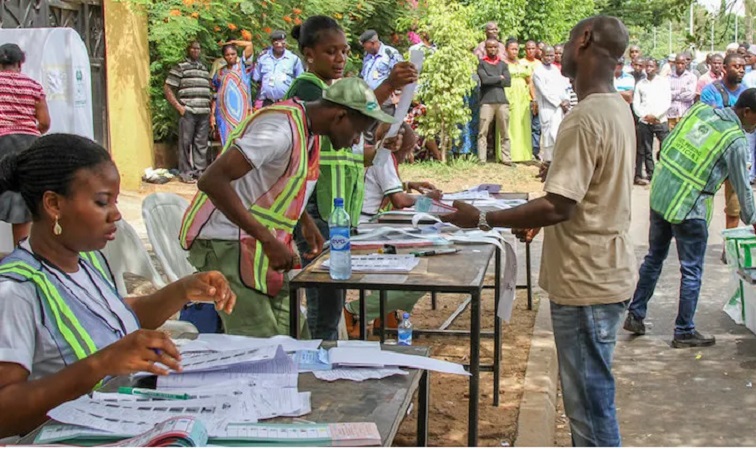
Once again, Nigeria is in a period where its citizenry will have to head to the ballot stand and give their general verdict on the performance of an incumbent political party at the Federal and State levels as well in their Federal and State legislative houses and whether they seek a continuum or a change.
However, the reality is that in Nigeria, elections do not always go according to plan, with varying issues from doubts about the neutrality of the country’s electoral bodies to the constant worries of practices like election thuggery and vote-buying.
In the year 2022, the new Electoral Act of 2022 was passed, effectively repealing the former Electoral Act 2010 & introducing to the Nigerian Electoral space a new set of lexicons , the most infamous of them undoubtedly being the Bimodal Voter Accreditation System, BVAS, which has for good or bad, dragged Nigerian Electoral Practice into the era of Technology.
Register for Tekedia Mini-MBA edition 19 (Feb 9 – May 2, 2026): big discounts for early bird.
Tekedia AI in Business Masterclass opens registrations.
Join Tekedia Capital Syndicate and co-invest in great global startups.
Register for Tekedia AI Lab: From Technical Design to Deployment (next edition begins Jan 24 2026).
This article will be focused for the most part on the topics of :-
– The regulatory framework governing elections in Nigeria & its functions.
– The requirements for a validly held election in Nigeria.
– The requirements for elections conducted in cases of emergency.
– The practice of over-voting under Nigerian Law.
– Election result collation procedures.
– The use of violence during elections under Nigerian Law.
– The secrecy requirement in voting.
Which regulatory agency is in charge of conducting elections in Nigeria?
Elections in Nigeria under the purview of the Electoral Act 2022 & its pursuant INEC Regulations & Guidelines For Elections 2022 are placed within the jurisdiction of the Independent National Electoral Commission (INEC) which is statutorily charged with the functions of :-
– Voter & Civic Education.
– Promoting knowledge of sound democratic election processes.
– Conducting any referendum required to be conducted under the provisions of the Constitution of The Federal Republic of Nigeria or an act of the National Assembly.
What are the requirements for a validly held election under the Electoral Act?
For an election(in this case a presidential election) to be deemed validly held the following must occur :-
– The INEC must within 90 days to an election, put on display in every voter registration area and on all of its official online platforms, a list of voters assigned their Permanent Voter Cards (PVCs) and being eligible to vote.
– Ensure on the election day proper, full accreditation of each voter in an orderly line using the BVAS system device at a Polling Unit (PU).
– Assigning ballot papers to each accredited voter for voting .
– Carry out an open count of valid votes witnessed by agents of each participant political party and voters if any and an announcement of the results.
– Imputing the results(co-signed by each political party agent present) in the regulatory forms as prescribed by INEC and uploading same through the BVAS device into the INEC database.
– Onward physical transmission of results by the INEC PU presiding officer and other INEC staff accompanied by the agents of political parties present to the Ward collation center for further collation and in turn, transmission to the LG(Local Government) Collation center , to the State Collation Center & then the National Collation Center in that order.
What does the act say about voting in cases of emergencies?
The Electoral Act clearly states in its Section 24 that an emergency such as violence will not be a basis for disenfranchising a section of the populace and as a result, elections in such areas affected by emergencies are to be rescheduled by INEC.
What does the act say about over-voting?
The Act clearly states in its Section 51 that where over-voting (a situation of total votes cast being more than actually accredited voters) is seen to have occurred, the election results of any affected PU will be cancelled and there will be no return, necessitating a rerun election.
What does the act say about underage voting?
Underage persons are deemed ineligible to vote even where they somehow procure PVCs, but where a protest is made against this by INEC staff or other voters and the ineligible/underaged voters still go ahead to vote, Section 57 of the Act states that the words “protested against for impersonation” shall be placed by the INEC staff against the name of the ineligible voters in the voter register copy in their possession.
What does the Act say about the secret ballot practice?
The Act in its Section 122 clearly prohibits the practice of openly displaying their votes at a PU and prescribes a punishment of 100 Thousand Naira or an imprisonment term of 3 months .
What are the requirements for qualifying a voter under the act?
To be qualified to vote in Nigeria, a voter must:-
– Be a Nigerian citizen of at least 18 years of age & registered as a voter as evidenced through the issuance of a PVC.
What are the requirements for running for an electoral position under the Act?
To be able to run for an election, a prospective candidate must be :-
– a Nigerian citizen;
– registered as a voter;
– be of a minimum age of 25 years;
– have a minimum educational qualification requirement of a School leaving certificate or its equivalent;
– political party membership and sponsorship.
What are the factors that will disqualify a candidate from contesting or running for an election?
The factors that will disqualify a candidate from running for an election in Nigeria?
The factors that can disqualify an election candidate as prescribed by Section 102 of the Electoral Act include :-
– Lunacy/An unsound mind.
– A pending death sentence.
– A conviction and sentencing over an offence of dishonesty, or contravention of the code of conduct.
– Bankruptcy.
– Presenting a forged certificate within the preceding 10 years.
– Dismissal from public service.

Election Petitions in Nigeria
Under Nigerian Law, when election results have been announced, aggrieved parties have the option of seeking legal redress through a procedure known as an election petition.
This article will be looking at election petitions under the Electoral Act 2022, with a focus on :-
– Who is qualified to file an election petition.
– The grounds for filing an election petition.
– The legal effects on non-compliance with the provisions of the Electoral Act regarding election petitions.
– The effect of INEC regulations made pursuant to the Electoral Act regarding election petitions.
– The legal position of persons deemed to be winners of an election during the pendency of an election petition.
Who can present an election petition?
An election petition can be filed by either a candidate in an election or a political party that participated in an election. INEC can also be joined as a respondent where its officers are accused of violating the Electoral Act or contributing to the election result being contested by the petitioner.
What are the valid grounds for an election petition?
The grounds for an election petition as prescribed by the Electoral Act are :-
– A query against the qualification status of an elected candidate.
– Corrupt practices & non-compliance with the provisions of this Act.
– The respondent not being duly elected by the majority of lawful votes cast at the election.
It should be noted that an act or omission contrary to an instruction or directive of INEC shall not itself be a ground for an election petition.
It should also be noted that unsubstantial non-compliance with the the provisions of the Electoral Act or inconsistencies in election result dates will not be a valid ground for the success of an election petition.
When would a candidate be deemed qualified in the estimation of an election petition tribunal?
By virtue of Section 134 of the Electoral Act 2022, a person is deemed qualified to run for an election if he meets the applicable requirements of Sections 65,106,131 & 177 of the Constitution of The Federal Republic of Nigeria (as amended) and he is not in breach of Sections 66,107,137 or 182 of the Constitution as well.
Which body has jurisdiction over Election petitions in Nigeria?
The Court of Appeal of Nigeria & the Supreme Court of Nigeria have original jurisdiction & appellate jurisdiction respectively over presidential election petitions in Nigeria while Tribunals made up of Judges of High Courts have original jurisdiction over Gubernatorial Election petitions in Nigeria.
In what time frame should an election petition be filed?
An election petition must be filed within 30 days from the date of announcement of the election results.
What are the legal effects of INEC regulations made pursuant to the Electoral Act?
Section 148 of the Electoral Act states that regulations made pursuant to it such as the 2022 INEC Regulations & Guidelines For Election are for the purposes of giving effect to the provisions of the act and for its proper administration.
What this means is that provisions of the INEC regulations on electronic election results transmission (made pursuant to Section 62 of the Electoral Act) would be seen as carrying the force of law themselves.
What exactly is the provision of the Act on electronic collation of results?
Section 62 of the Electoral Act provides that INEC shall compile, maintain and update on a continuous basis, a register of election results to be known as the national electronic register of election results and the register of election results shall be kept in electronic format by INEC at its national headquarters.
This means that results are to be sent from the PU level, maintained and constantly updated electronically, hence the legal basis for the BVAS system.
What would be the legal position of elected persons who are parties to petitions contesting their elections?
Section 138 of the Electoral Act states that persons wrongly returned or elected shall remain in office pending the determination of am election petition.



